Are you familiar with banned books?These are the type of books that have been restricted or outright prohibited by various authorities for reasons such as offensive language, sexual content, or political views. It may seem peculiar that why someone would ban a said book, the history of some particular banned books is actually quite interesting.

Lets explore that why were these books banned and what can we learn from them?
NUMBER ONE:
One of the most famous banned books of all time is Ray Bradbury’s “Fahrenheit 451”. To be honest its kind of ironic to ban this book; as the novel first published in 1953, tells the story of a dystopian society where books are banned and burned by government. (Told you so)
The story follows the journey of Guy Montag, a fireman whose job is to burn books, as he begins to question the government’s authority and seeks to preserve the knowledge contained within the books.
It’s so much fun and refreshing to read a book by Ray Bradbury in today’s time, the idea and concept of a dystopian world without books will sure sweep the readers away.
“You don’t have to burn books to destroy a culture. Just get people to stop reading them.”— Ray Bradbury

NUMBER TWO:
You may have heard of the classic novel ‘Ulysses’ right? But do you know it was once banned in multiple countries? That’s right, The most important novel of 20th century was banned when it was first released due to its controversial content and themes.
In 1922, the book was banned in the United States under the Comstock law, which prohibited the distribution of obscene materials. It was also banned in the UK and Canada for its sexual content.
Despite its ban, the book continued to gain popularity and acclaim. It was seen as the symbol of artistic freedom and many saw the censorship as an attempt to suppress challenging and innovative literature.
Finally in 1934 all charges were lifted and we could get our hands on this masterpiece yet again.

The book’s legacy lives on and its impact on literary world continues to be felt to this day. Reading a book becomes more important now that we know the history of some amazing books.
NUMBER THREE:

To read a book wasn’t that much of a big deal until the news of “The Satanic Verses” by Salman Rushdie came through. This particular incident must still be fresh for many of you and *nudge nudge* The readers of course as it caused a worldwide stir for long time. The novel caused an international scandal due to its depiction of the prophet Muhammad. It was banned in several countries, including Iran and India and led to a fatwa (death sentence) against the author. Ooh it still gives us the chills.
NUMBER FOUR:
Believe it or not, Harry Potter Series, the best selling books by J.K Rowling has been banned in several countries and schools due to its depiction of magic and wizardry. Some religious groups have also critiqued the series for promoting witchcraft and messing with young brains.
Many religious groups have been critical that it promotes a belief in the supernatural, which goes against their teachings.
Some parents also asked the authorities to remove them from the school libraries (talk about extreme)
Despite many controversies The Harry Potter books remain extremely lovable by all age groups with millions of copies being sold worldwide even till date.
Fun fact: The book has been translated into more than 80 languages.

NUMBER FIVE:
The powerful and heartbreaking memoir “The Diary of Anne Frank” has been banned in several countries for its depiction of Jewish suffering during the holocaust.
Despite this, it remains a widely read and cherished book.
It has been kitabay.com’s most popular book of all time.
Do you know its illegal to publish Anne Frank’s original diary in several countries including Soudi Arabia and Lebenon. Adittionally, some schools in the United States have banned the book from their curriculum due to its mature content.
NUMBER SIX:
"The Catcher in the Rye" by J.D. Salinger
This coming-of-age novel has been banned for its profanity, sexual content, and portrayal of rebellion. However, it remains a beloved classic and a staple of high school English curriculums.
Fun Fact: The title of the book comes from a misheard lyric from the song "Comin' Thro' the Rye" by Robert Burns. The actual lyric is "If a body meet a body, comin' thro' the rye."

NUMBER SEVEN:
"1984" by George Orwell
1984, written by George Orwell, is a dystopian novel that was first published in 1949. The novel explores the dangers of totalitarianism and a government that controls every aspect of its citizens' lives. It follows the life of a man named Winston Smith, who works for the government and begins to question the actions of his leaders.
Despite its critical acclaim and popularity, 1984 has been banned in various countries for its controversial themes and depiction of totalitarianism.
Fun Fact: The novel was originally titled "The Last Man in Europe," but the publisher suggested changing it to the now-famous title "1984." The new title is a reference to the year 1948, which was when Orwell wrote the novel.

NUMBER EIGHT:
We all have read and admired this novel whole heartedly, I’m sure all of us by now must know about this masterpiece.
Gabriel Garcia Marquez's masterpiece "One Hundred Years of Solitude" is a novel that has been both praised and banned in various parts of the world. Set in the fictional town of Macondo, the novel tells the story of the Buendia family and their seven generations, as they navigate through love, war, politics, and the magical realism of Latin America.
Despite its literary acclaim, the novel has faced censorship and been banned in several countries. In 1970, it was banned in Marquez's home country, Colombia, for its alleged portrayal of sex and violence. The government believed that the book's content could incite violence and was therefore a threat to national security. However, the ban was lifted after Marquez won the Nobel Prize in Literature in 1982.
The novel has also been banned in other countries, including Chile and Argentina, where it was deemed to be promoting Marxist ideals. It was even banned in some parts of the United States, where it was challenged for its use of explicit language and sexual content.
Despite the controversy, "One Hundred Years of Solitude" remains a literary masterpiece, known for its vivid imagery, rich symbolism, and magical realism. It has been translated into more than 40 languages and continues to be widely read and loved by readers around the world.

In conclusion, banned books often provide a window into controversial and thought-provoking topics, and reading them can lead to important conversations and deeper understanding. So go ahead and explore these forbidden fruits, and remember that knowledge should never be suppressed.



